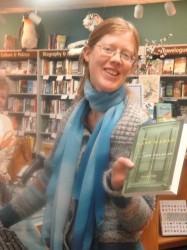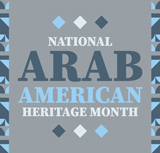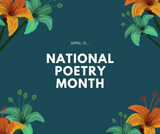 As a bookseller who is also a mostly unpublished writer, I crave contact with other serious writers. One of my main tasks at Paulina Springs Books is booking our author events, which means I get to meet or have contact with all the authors who come through here. You would think this would be the perfect opportunity for me to connect with other writers. But, for the most part, I don’t tell the authors I meet that I’m a writer. This is partly because my job is to promote them, not myself, and partly out of shyness. No, actually, it’s more out of fear.
As a bookseller who is also a mostly unpublished writer, I crave contact with other serious writers. One of my main tasks at Paulina Springs Books is booking our author events, which means I get to meet or have contact with all the authors who come through here. You would think this would be the perfect opportunity for me to connect with other writers. But, for the most part, I don’t tell the authors I meet that I’m a writer. This is partly because my job is to promote them, not myself, and partly out of shyness. No, actually, it’s more out of fear.
What is there to be afraid of? Well, plenty. The other day, a very nice author, Shelley Houston, came back into the store to visit. I’d felt comfortable enough with her to share that I’m working on a book (actually, it’s several books, but saying you’re working on a group of interconnected books is a little much to explain to a new acquaintance), so this time, she asked me how my writing is going. This is why I usually don’t tell authors that I write. If they don’t ask me how my writing is going, I feel ignored. If they do ask me, I panic, hem and haw, look at the floor, shuffle my feet, say “It’s . . . going,” and find myself fresh out of words to describe my progress. I must come off like one of those wannabe writers who never actually sits down and writes, when the truth is, I spend huge chunks of my life writing, and quite seriously. I just can’t seem to sum up my progress to a near-stranger in a minute or two. My mind goes blank, and I forget to mention any accomplishments, like the short pieces I’ve had published lately, or the fact that I did finish one of my books this winter. I didn’t feel any accomplishment when I got to the end of that book, only grief and loss, so I don’t feel in the least like talking about it.
So I stall and shuffle my feet and become generally non-communicative until the kind author gives up that line of conversation, or else she kindly throws me some helpful tips about how insanely difficult it is to get published, which is really what I need to hear. Maybe this would be good if I were like the customer who comes in and tells me she’s writing a book and when it gets published, she’s going to use the first million to send all the grandkids to college. In that case, it would be good if someone steeled me for some disappointment.
But I’ve worked in the book trade for 18 years, and my dad is a freelance writer with a book he ended up having to self-publish, and I’ve known enough authors to know that even if I do get traditionally published and have good success, I probably still need a day job. So I’m pretty well-steeled. I’m not sure why a writer would throw out this line of conversation anyway. Is she trying to scare me? She doesn’t need to—she’s already terrified me with her question, “How is your writing going?”
To be fair, most of the authors with whom I’ve shared that I’m a writer have been very kind. Rosanne Parry took me out to dinner after her author event and talked about writing. Jane Kirkpatrick told me, “I was a shy writer, too” and suggested writer’s conferences and workshops, which I haven’t gone to because a) I can’t afford to and b) I would rather stay home and write. Marcus Borg spent a good chunk of time when I was supposed to be interviewing him, interviewing me about my novel(s). Randy Sue Coburn wrote letters back and forth with me about the writing process. Brian Doyle said not to worry that I have ten large binders full of material under my bed. “Maybe you’ll suddenly publish several books all at once,” he said. Sandra Dallas signed one of her books to me with the inscription, “Someday you’ll sign a book for me.” I’ll keep that book forever.
So I guess it’s just me who’s embarrassed at not having more to report. It kind of parallels how my husband feels around horse farmers. He’s a market gardener who works with hand tools and hopes to get draft horses someday, and we go to a lot of events made up mostly of horse farmers. After he asks the old-timers some questions, they invariably ask, “So when are you going to get your horses?” and he feels embarrassed because, year after year, we still don’t have any. I always encourage him not to rob himself of the camaraderie and the knowledge he can gain by continuing to talk with these people, even though we still don’t have horses. I guess I should tell myself the same thing about talking to authors. After all, how many people get to meet so many of them?
One encouraging thing in meeting authors has been to see that most of them are very normal everyday people, like myself. They don’t have any superpowers, either, and they managed it. After the author leaves, I resume being a bookseller, which I know I’m good at and which pays the bills. Then I go home and cook dinner, and the next day I wake up and write something, which is usually how I respond to being scared and uncertain. It works out pretty well, after all.
Amanda MacNaughton works as a front-line bookseller and events coordinator for Paulina Springs Books in Sisters and Redmond, OR. She says she is “presently (well, constantly) working on a group of interconnected novels (think Anne of Green Gables or the Mitford series, structure-wise), but I like to call them ‘stories’ because it is less intimidating.” MacNaughton has been published in The Christian Science Monitor, first when she was 11 years old and then later, and in Brilliant Star, an international Ba’hai magazine, with a children’s story that was later turned into a puppet show in Japan. Lucky for us, MacNaughton has also interviewed Jane Kirkpatrick, Anjali Banerjee, Marcus J. Borg and Brian Doyle.


